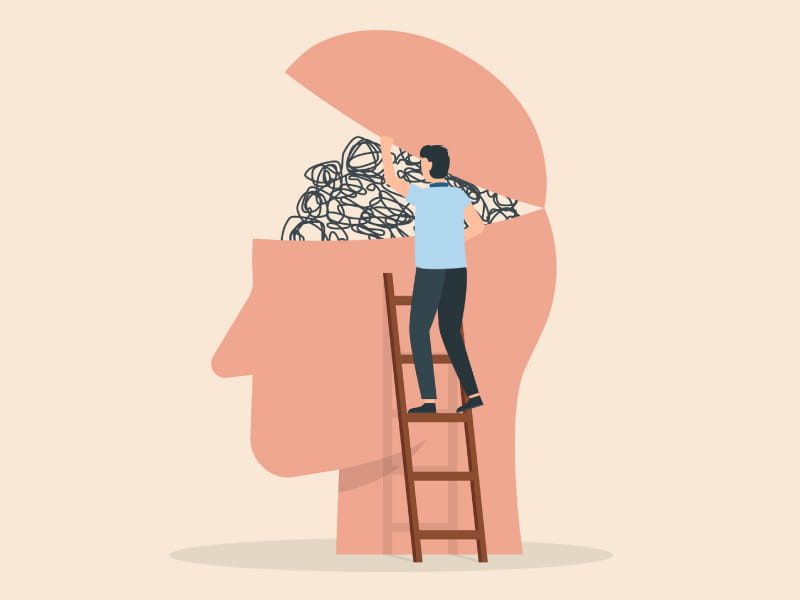Are you that blitheringly stupid that you don't understand you attack the primary cause of depression to prevent it rather than trying to treat after it occurs? The idea is incredibly simple; you create EXACT 100% recovery protocols. Your patients will be too busy counting reps and looking forward to recovery to get depressed.
Stroke tied to higher risk for depression and other mood disorders
By Thor Christensen, American Heart Association News

Stroke survivors may have a higher risk of developing depression or another mood disorder within the first year, according to new research that compared their risk to the general public as well as people who survived a heart attack.
Past research shows depression is common after stroke, affecting nearly one-third of survivors. For the new study, researchers wanted to dig deeper and see how stroke impacts other mental disorders.
The study, published Wednesday in the American Heart Association journal Stroke, focused on 86,111 people in Danish hospitals from 2004 to 2018 with no history of mental health disorders who had a stroke.
It found that stroke survivors had a 15% risk of developing a mood disorder, primarily depression, within the first year. This risk corresponded to an approximately 2.3-fold increased risk compared with matched individuals from the Danish general population. Stroke survivors also had an increased risk for other mental health problems, including substance abuse disorders and stress and anxiety disorders, as well as brain disorders such as dementia. But these conditions were less common.
"Prevention of these outcomes has obvious importance. But unfortunately, that is easier said than done,"(Well then you are not a leader, leaders tackle the BHAG(Big Hairy Audacious Goals)
said Nils Skajaa, the study's lead author. He called for increased recognition of post-stroke mental disorders and early interventions, including counseling.
"Although risks tended to be higher after severe stroke, risks were still increased in patients with mild stroke – which emphasizes a need for mental health evaluation even in patients with seemingly full physical recovery," said Skajaa, a Ph.D. student in clinical epidemiology at Aarhus University Hospital in Denmark.
The study also showed stroke survivors' chances of developing depression are nearly 70% higher than people who survive a heart attack. A U.S. study published last year in the journal Neurology came to a similar conclusion: Stroke patients were 50% more likely than heart attack patients to develop depression.
Skajaa said the study was limited by the use of hospital data, which might have missed mild cases, and by surveillance bias – the idea that hospitalization and follow-up care might lead to an increased probability of a diagnosis for a mental disorder. While the study was conducted in Denmark, he said the findings also are applicable in the U.S.
Dr. Laura K. Stein, who was not involved in the research, said the study "gives us more insight into the mental health complications following stroke, which may be, at least in part, related to biological changes in the brain. It expands what we know about mental health disorders after stroke and shows us just how much more likely patients with stroke are to develop mental health disorders than people in the general population."
Stein, an assistant professor of neurology at the Icahn School of Medicine at Mount Sinai in New York City, called for future research to uncover the biological and psychosocial factors that might contribute to post-stroke depression. She also would like to see studies on the best methods of treating post-stroke depression – not just with medication, but with counseling, cognitive behavioral therapy, exercise and other lifestyle interventions.
Stein pointed out that while post-stroke depression is most common in the first year after a stroke, patients are still at risk for a long time after that.
"Patients, family members and caregivers need to be on the lookout for any signs of depression or other mental health disorders. They need to have a conversation with their doctors about any change in someone's post-stroke trajectory," said Stein, who also is an attending physician at the Mount Sinai and Mount Sinai Queens stroke centers.
"Post-stroke depression and other mental health disorders are treatable illnesses. If we take them seriously and investigate all causes and treatment options, it will improve the outcomes and quality of life for stroke survivors in the U.S. and around the world."
If you have questions or comments about this story, please email editor@heart.org.
No comments:
Post a Comment